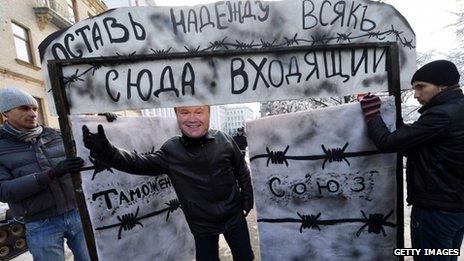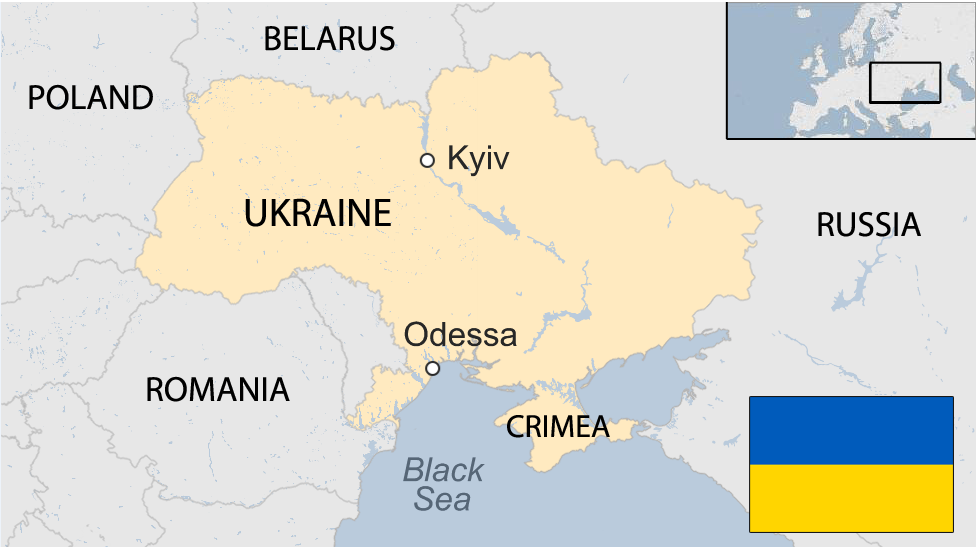Press suspicious as Russia-Ukraine talks postponed
- Published

This protest warns "Customs Union" and "Abandon hope, all ye who enter here"
The last-minute cancellation of talks between Russia's President Vladimir Putin and his Ukrainian counterpart Viktor Yanukovych in Moscow on Tuesday has stunned press commentators in both countries.
There is broad agreement that the talks' postponement until a later, unspecified date signals a crisis in relations. However, opinions are split about who has gained the advantage.
Ukraine's accession to the Moscow-led Customs Union of Russia, Belarus and Kazakhstan would have saved it from economic ruin, argues a state-owned newspaper in Russia. But commentators in Ukraine say Kiev is not ready to pay the price of giving up closer ties with the EU.
'Major differences'
Russia's influential daily Kommersant believes that the cancellation "indicates major differences between Kiev and Moscow, and shows that neither side intends to make any concessions at this stage".
According to the paper's sources, the Kremlin had agreed to cut gas prices for Ukraine in exchange for "integration moves", but the meeting was cancelled after the deal collapsed.
"The meeting will take place as soon as Ukraine is ready to accept Russia's terms and conditions," Kommersant's sources say.
"Moscow has run out of patience," says pro-government Russian daily Izvestiya. "Kiev has been messing around with Moscow for more than three years" over the Customs Union, it fumes.
The paper also criticizes Kiev for oscillating between Russia and Europe, accusing it of "an unwavering intention to... sit on two chairs - Russian and European - at once".
"Ukrainian-Russian ties are on the verge of a major crisis," says an article in Russia's centrist daily Nezavisimaya Gazeta.
A Kiev-based commentator, Serhiy Taran, tells the paper that the meeting could have been cancelled due to a mutual lack of trust. "Moscow has figured out Kiev's devious plans: stall for time until the Ukraine-EU summit planned for 25 February, playing off the interests of both partners," he argues.
Gas prices are a thorny issue between the two former Soviet neighbours. In 2009 a gas payment dispute between them disrupted supplies to thousands of homes and businesses across the EU, during a bitterly cold winter.
Most of Russia's gas exports to Europe are pumped through Ukrainian pipelines, but new undersea pipeline projects in the Baltic and Black Sea bypass Ukraine.
'Off the hook'
Ukraine's heavyweight daily Den argues that Moscow planned to pressure Mr Yanukovych into "finally abandoning the European path". But, it goes on, Mr Yanukovych baulked at the prospect, realizing it would undermine his support in Ukraine.
This view is echoed by pro-opposition daily Hazeta Po-Ukrayinski, which considers that "Ukraine has got off Moscow's hook once again". "Russia's plan failed," commentator Volodymyr Horbach tells the paper, arguing that the Kremlin wanted to draw Kiev even closer into its orbit and thus render any talks with the EU pointless.
Segodnya, a tabloid usually supportive of the Ukrainian government, is also optimistic. "Yanukovych avoids repeating Tymoshenko's gas mistake", says a headline, referring to gas contracts with Russia signed by ex-Prime Minister Yulia Tymoshenko, for which she is currently serving a seven-year sentence.
One possible reason why Mr Yanukovych did not fly to Moscow was "a phone call from Europe", Segodnya argues. But its sources are at a loss to explain what it was about: "What kind of promise could the EU have made which outweighs cheap gas?"
BBC Monitoring, external reports and analyses news from TV, radio, web and print media around the world. For more reports from BBC Monitoring, click here. You can follow BBC Monitoring on Twitter, external and Facebook, external.
- Published27 January

- Published21 September 2010